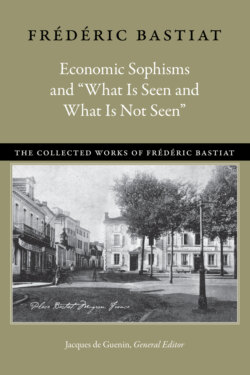Читать книгу Economic Sophisms and “What Is Seen and What Is Not Seen” - Bastiat Frédéric - Страница 7
На сайте Литреса книга снята с продажи.
Оглавление[print edition page vii]
Contents
Foreword by Robert McTeer
General Editor’s Note
Note on the Translation
Key Terms
Note on the Editions of the Œuvres complètes
Abbreviations
Acknowledgments
A Chronology of Bastiat’s Life and Work
Introduction by David M. Hart
A Note on the Publishing History of Economic Sophisms and What Is Seen and What Is Not Seen by David M. Hart
Map of France Showing Cities Mentioned by Bastiat
Map of Southwestern France
Economic Sophisms
Economic Sophisms First Series
[Author’s Introduction]
1. Abundance and Scarcity
2. Obstacle and Cause
3. Effort and Result
4. Equalizing the Conditions of Production
5. Our Products Are Weighed Down with Taxes
6. The Balance of Trade
7. Petition by the Manufacturers of Candles, Etc.
8. Differential Duties
9. An Immense Discovery!!!
[print edition page viii]
10. Reciprocity
11. Nominal Prices
12. Does Protection Increase the Rate of Pay?
13. Theory and Practice
14. A Conflict of Principles
15. More Reciprocity
16. Blocked Rivers Pleading in Favor of the Prohibitionists
17. A Negative Railway
18. There Are No Absolute Principles
19. National Independence
20. Human Labor and Domestic Labor
21. Raw Materials
22. Metaphors
Conclusion
Economic Sophisms Second Series
1. The Physiology of Plunder
2. Two Moral Philosophies
3. The Two Axes
4. The Lower Council of Labor
5. High Prices and Low Prices
6. To Artisans and Workers
7. A Chinese Tale
8. Post Hoc, Ergo Propter Hoc
9. Theft by Subsidy
10. The Tax Collector
11. The Utopian
12. Salt, the Mail, and the Customs Service
13. Protection, or the Three Municipal Magistrates
14. Something Else
15. The Free Trader’s Little Arsenal
16. The Right Hand and the Left Hand
17. Domination through Work
Economic Sophisms “Third Series,”
1. Recipes for Protectionism
2. Two Principles
[print edition page ix]
3. M. Cunin-Gridaine’s Logic
4. One Profit versus Two Losses
5. On Moderation
6. The People and the Bourgeoisie
7. Two Losses versus One Profit
8. The Political Economy of the Generals
9. A Protest
10. The Spanish Association for the Defense of National Employment and the Bidassoa Bridge
11. The Specialists
12. The Man Who Asked Embarrassing Questions
13. The Fear of a Word
14. Anglomania, Anglophobia
15. One Man’s Gain Is Another Man’s Loss
16. Making a Mountain Out of a Molehill
17. A Little Manual for Consumers; in Other Words, for Everyone
18. The Mayor of Énios
19. Antediluvian Sugar
20. Monita Secreta: The Secret Book of Instructions
21. The Immediate Relief of the People
22. A Disastrous Remedy
23. Circulars from a Government That Is Nowhere to Be Found
24. Disastrous Illusions
What Is Seen and What Is Not Seen, or Political Economy in One Lesson
[The Author’s Introduction]
1. The Broken Window
2. Dismissing Members of the Armed Forces
3. Taxes
4. Theaters and the Fine Arts
5. Public Works
6. The Middlemen
7. Trade Restrictions
8. Machines
[print edition page x]
9. Credit
10. Algeria
11. Thrift and Luxury
12. The Right to Work and the Right to Profit
Appendixes
Appendix 1. Further Aspects of Bastiat’s Life and Thought
Appendix 2. The French State and Politics
Appendix 3. Economic Policy and Taxation
Appendix 4. French Government’s Budgets for Fiscal Years 1848 and 1849
Appendix 5. Mark Twain and the Australian Negative Railroad
Appendix 6. Bastiat’s Revolutionary Magazines
Addendum: Additional Material by Bastiat
“A Few Words about the Title of Our Journal The French Republic” (La République Française, 26 February 1848)
“The Subprefectures,” 29 February 1848, La République Française
Bastiat’s Speech on “Disarmament and Taxes” (August 1849)
Glossaries
Glossary of Persons
Glossary of Places
Glossary of Newspapers and Journals
Glossary of Subjects and Terms
Bibliographical Note on the Works Cited in This Volume
Bibliography
Index
